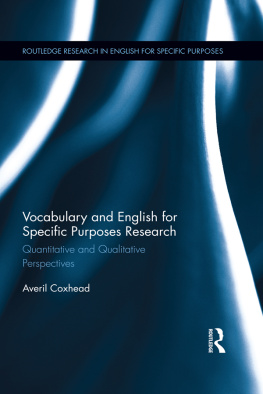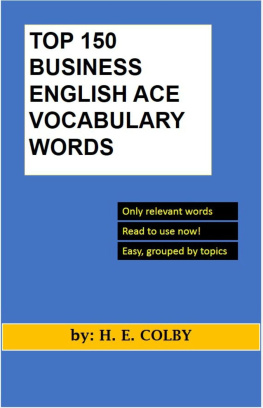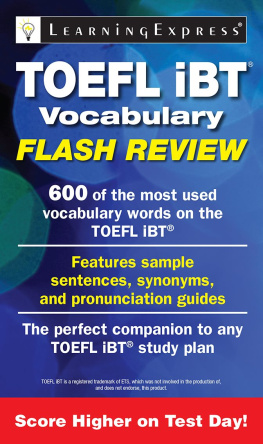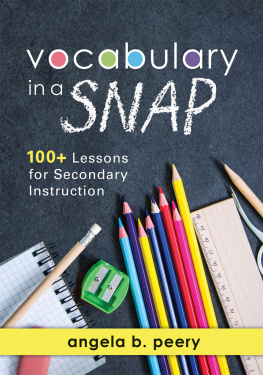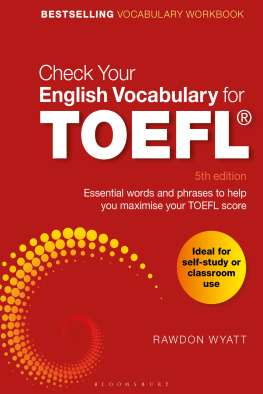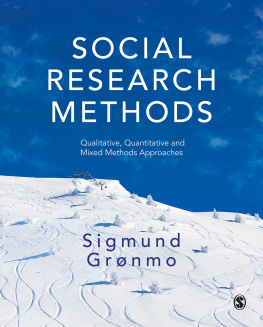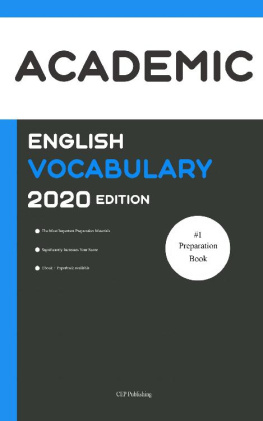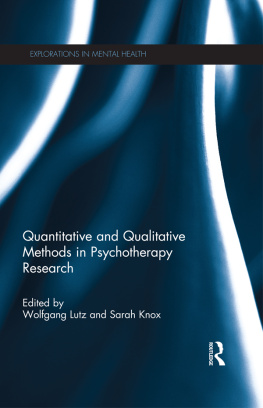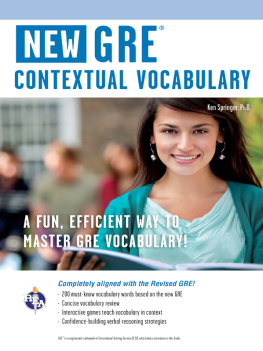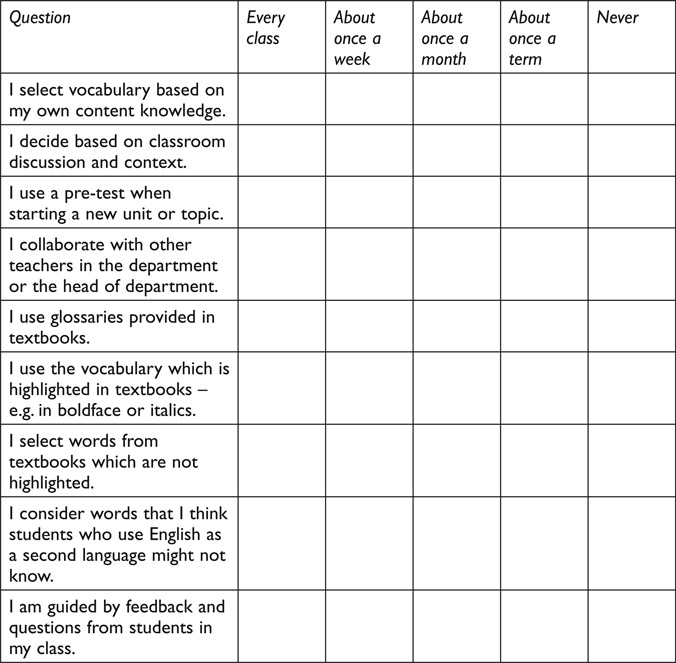The right of Averil Coxhead to be identified as author of this work has been asserted by her in accordance with sections 77 and 78 of the Copyright, Designs and Patents Act 1988.
All rights reserved. No part of this book may be reprinted or reproduced or utilised in any form or by any electronic, mechanical, or other means, now known or hereafter invented, including photocopying and recording, or in any information storage or retrieval system, without permission in writing from the publishers.
Routledge Research in English for Specific Purposes
Series editors: Brian Paltridge and Sue Starfield
Routledge Research in English for Specific Purposes is a series of monograph studies showcasing cutting-edge research in the field of English for Specific Purposes. Books in this series provide theoretically innovative and empirically rigorous examples of research that advance understanding of topics within ESP, each providing a comprehensive background, a survey of modern research and avenues for future exploration in the area.
Brian Paltridge is Professor of TESOL at the University of Sydney. He has taught English as a second language in Australia, New Zealand and Italy and has published extensively in the areas of academic writing, discourse analysis and research methods. He is editor emeritus for the journal English for Specific Purposes and co-edited the Handbook of English for Specific Purposes (Wiley, 2013).
Sue Starfield is a Professor in the School of Education and Director of The Learning Centre at the University of New South Wales. Her research and publications include tertiary academic literacies, doctoral writing, writing for publication, identity in academic writing and ethnographic research methods. She is a former editor of the journal English for Specific Purposes and coeditor of the Handbook of English for Specific Purposes (Wiley, 2013).
www.routledge.com/Routledge-Research-in-English-for-Specific-Purposes/book-series/RRESP
Titles in this series
Aviation English
Dominique Estival, Candace Farris and Brett Molesworth
Vocabulary and English for Specific Purposes Research
Quantitative and Qualitative Perspectives
Averil Coxhead
Contents
Guide
I would like to thank my colleagues and postgraduate students in the School of Linguistics and Applied Language Studies, Victoria University of Wellington, for their advice and feedback on ideas and drafts. Thank you also to all the teacher and student participants and research assistants who have taken part in research that forms a significant portion of this book.
Questions 4 and 5 from the online survey on how teachers decide what specialised vocabulary to focus on (Coxhead, 2011)
5. Please tell us about other ways you decide on what specialised vocabulary to focus on.
Ackermann, K. & Chen, Y.-H. 2013. Developing the Academic Collocation List (ACL): A corpus-driven and expert-judged approach. Journal of English for Academic Purposes , 12(4): 235247.
del, A. 2014. Selecting quantitative data for qualitative analysis: A case study connecting a lexicogrammatical pattern to rhetorical moves. Journal of English for Academic Purposes , 16: 6880.
del, A. & Erman, B. 2012. Recurrent word combinations in academic writing by native and non-native speakers of English: A lexical bundles approach. English for Specific Purposes , 31: 8192.
del, A. & Rmer, U. 2012. Research on advanced student writing across disciplines and levels: Introducing the Michigan corpus of upper-level student papers. International Journal of Corpus Linguistics , 17(1): 334.
Aiguo, W. 2007. Teaching aviation English in the Chinese context: Developing ESP theory in a non-English speaking country. English for Specific Purposes , 26: 121128.
Akbarian, I. 2010. The relationship between vocabulary size and depth for ESP/EAP learners. System , 38(3): 391401.
Altenberg, B. 1998. On the phraseology of spoken English: The evidence of recurrent word-combinations, in Phraseology: Theory, analysis, and application , edited by Anthony Cowie. Oxford: Clarendon Press: 101122.
Anthony, L. 7 Febuary 2016. Ant Word Profiler . [Online]. Available: www.laurenceanthony.net/software/antwordprofiler/.
Ardasheva, Y. & Tretter, T. 2017. Developing science-specific, technical vocabulary of high school newcomer English learners. International Journal of Bilingual Education and Bilingualism , 20(3): 252271.
Barton, D. & Cox, A. 2013. Delta mathematics . Auckland: Pearson.
Basturkmen, H. 2006. Ideas and options for English for Specific Purposes . Mahwah, NJ: Continuum.
Basturkmen, H. 2010. Developing courses in English for Specific Purposes . Basing-stoke, Hampshire, UK: Palgrave Macmillan.
Basturkmen, H. & Shackleford, N. 2015. How content lecturers help students with language: An observational study of language-related episodes in interaction in first year accounting classrooms. English for Specific Purposes , 37: 8797.
Bauer, L. & Nation, I. S. P. 1993. Word families. International Journal of Lexicography , 6: 253279.
Becher, T. 1989. Academic tribes and territories . Milton Keynes, UK: The Society for Research into Higher Education and Open University Press.
Beck, I., McKeown, M. & Kucan, L. 2013. Bringing words to life: Robust vocabulary instruction (second edition). New York: Guildford Press.
Belcher, D., Serrano, F. & Yang, H. 2016. English for professional academic purposes, in The Routledge handbook of English for academic purposes , edited by Ken Hyland & Phillip Shaw. Abingdon, Oxon, UK: Routledge: 502514.
Bennett, G. 2010. Using corpora in the language learning classroom . Ann Arbor, MI: University of Michigan Press.
Biber, D. 2006. University language . Amsterdam: John Benjamins.
Biber, D. & Barbieri, F. 2007. Lexical bundles in university spoken and written registers. English for Specific Purposes , 26(3): 263286.
Biber, D., Conrad, S. & Cortes, V. 2004. If you look at: Lexical bundles in university teaching and textbooks. Applied Linguistics , 25(3): 371405.
Biber, D., Conrad, S. & Reppen, R. 1998. Corpus linguistics: Investigating language structure and use . Cambridge: Cambridge University Press.
Biber, D., Johansson, S., Leech, G., Conrad, S. & Finegan, E. 1999. Longman grammar of spoken and written English . Harlow, England: Pearson Education.
Biber, D., Reppen, R., Schnur, E. & Ghanem, R. 2016. On the (non)utility of Juil-lands D to measure lexical dispersion in large corpora. International Journal of Corpus Linguistics , 21(4): 439464.

